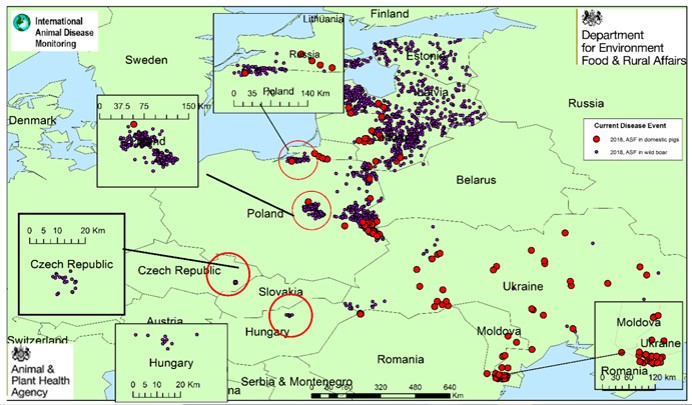



APHA produces latest ASF update
The Animal Plant and Health Agency has provided their most recent update on the movement of African swine fever through Europe
The number of reported incidences of ASF in domestic swine and wild boar since 2018. APHA is continuously updating their epidemiological map of African swine fever. Map: ©APHA
Since the last APHA update in April, more outbreaks of African swine fever have been reported in Eastern Europe and Western Eurasia, with the last cases reported in Hungary, Ukraine and Romania.
It is believed that the most recent cases of ASF reported in Hungary and Romania, countries bordering Ukraine, are primarily a result of wild boar movement. Movement of the disease is also thought to be caused by hunters moving between wild boar populations, and pig farm workers moving between facilities and across borders without abiding by proper biosecurity measures.
To date, the disease has been contained within Eastern Europe but is moving ever closer to Western Europe where much larger, commercial pig herds are raised. The implications of ASF entering domestic swine herds to the West could be catastrophic, therefore DEFRA, APHA and other government-backed disease-monitoring initiatives are publicly campaigning to raise awareness of how the disease is spreading.
Citizens and farm workers are being urged to dispose of any food waste responsibly and away from areas where wild boar are known to reside. Anyone travelling across borders from areas with known cases of ASF are also encouraged not to bring any food produce or potentially contaminated equipment into 'uninfected areas'.
The feeding of swill, kitchen scraps and catering waste to domestic pigs, feral pigs and wild boar is is illegal in the UK and is being discouraged through public campaigns across Europe.
To read the full ASF update produced by APHA, click here
Steps for prevention
Food waste
- Do not take pig meat onto farms, or restrict all food (and consumption of food) to a canteen.
- Do not feed domestic pigs food waste; this is illegal in the UK, other EU regions and some states within the US.
- Where ‘permitted garbage feeding’ is legal in US states, pigs fed this way are prohibited from exportation.
- Do not leave food waste exposed for wild swine species to access. Dispose of food waste properly.
- Follow rules and regulations on disposal of food waste at ferry ports and airports.
Borders and transportation
- Check infected regions before import of goods that could potentially be contaminated.
- Advise and educate people on the risks of bringing back pork products from infected regions.
Biosecurity
- Abide by strict biosecurity rules.
- All staff on farm should be inducted onto a strict programme of hand and equipment sanitisation before and after contact with pigs.
- Provide the means for staff and visitors to thoroughly sanitise their hands and equipment. Restricting visitor access to infected pigs and herds is advised.
Isolation
- Isolate potentially infected pigs and herds with strict ring-fencing of farms and a one-entrance, one-exit policy.
- If bringing new pigs into the herd, allow for an extended quarantine period to ensure that incoming pigs are safe to introduce to the herd, and to prevent the existing herd from infecting new individuals.
Wild boar
- Ensure that wild boar, warthogs and wild pigs, and materials potentially contaminated by such wild species do not come into contact with domestic pigs.
To learn more about African swine fever, visit The Pig Site Knowledge Centre
To check any signs you are worried about, head to The Pig Site Disease Problem Solver







